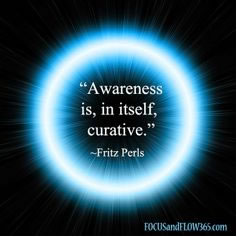Gestalt Therapy
Gestalt Therapy is an existential/experiential form of psychotherapy that emphasizes personal responsibility, and that focuses upon the individual’s experience in the present moment,
Gestalt Therapy is an existential/experiential form of psychotherapy that emphasizes personal responsibility, and that focuses upon the individual’s experience in the present moment, the therapist–client relationship, the environmental and social contexts of a person’s life, and the self-regulating adjustments people make as a result of their overall situation.
 Gestalt therapy was developed by Fritz Perls, Laura Perls and Paul Goodman in the 1940s and 1950s, and was first described in the 1951 book Gestalt Therapy.
Gestalt therapy was developed by Fritz Perls, Laura Perls and Paul Goodman in the 1940s and 1950s, and was first described in the 1951 book Gestalt Therapy.
Gestalt therapy is a Humanistic approach to psychotherapy that helps clients focus on Gestalt therapy focuses on process (what is actually happening) over content (what is being talked about). The emphasis is on what is being done, thought, and felt at the present moment (the phenomenality of both client and therapist), rather than on what was, might be, could be, or should have been. Instead of simply talking about past situations, clients are encouraged to experience them, perhaps through re-enactment. Through the gestalt process, clients learn to become more aware of how their own negative thought patterns and behaviours are blocking true self-awareness and making them unhappy.
Gestalt therapy is a method of awareness practice (also called “mindfulness” in other clinical domains), by which perceiving, feeling, and acting are understood to be conducive to interpreting, explaining, and conceptualizing (the hermeneutics of experience). This distinction between direct experience versus indirect or secondary interpretation is developed in the process of therapy. The client learns to become aware of what he or she is doing and that triggers the ability to risk a shift or change.
The objective of Gestalt therapy is to enable the client to become more fully and creatively alive and to become free from the blocks and unfinished business that may diminish satisfaction, fulfillment, and growth, and to experiment with new ways of being
Change requires an acceptance of the individual as a whole, including accepting those parts that they would rather disown. The paradox is that by giving up trying to change, change and growth will occur naturally through a process of ongoing awareness, contact and assimilation.
Gestalt and the ‘Paradoxical Theory of Change’
Paradoxical theory of change is at the core of the Gestalt therapy change theory. The paradox is that the more one tries to be who one is not, the more one stays the same. The underlying principle is that when people identify with their whole self and acknowledge whatever arises at that moment, the conditions for wholeness and growth are created. When people do not identify with parts of themselves, inner conflict is created.








